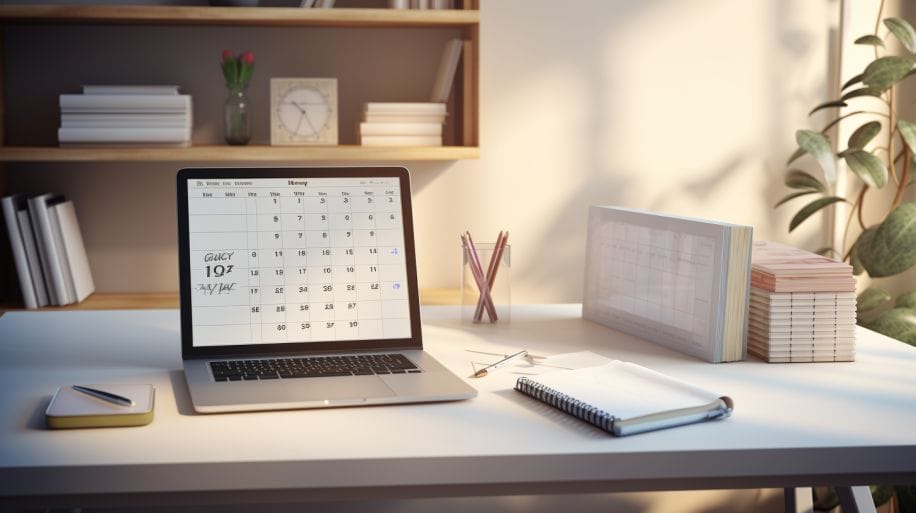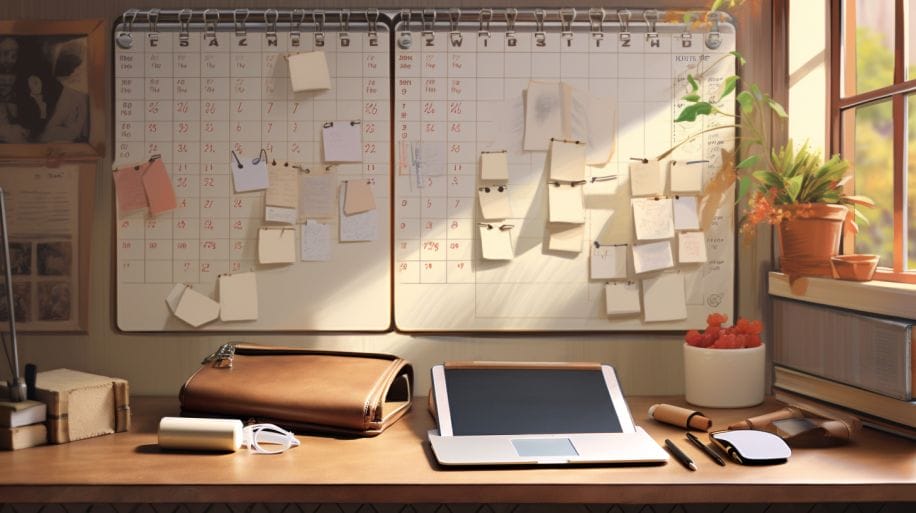Being a resolute person, it’s not uncommon for me to feel remorse when the speed of my work declines. I often doubt my dedication, even when circumstances outside of my control cause the decrease in productivity.
But I’ve learned that these periods of idle time are natural, and I shouldn’t let them get to me. Now, I embrace them, use them to grow, and prepare for future slumps.
Let me share how you can too.
Key Takeaways
- Productivity fluctuates in every industry.
- Feeling guilty when not productive is natural.
- Slow work periods can trigger feelings of guilt.
- It can be a fantastic opportunity for growth and personal development.
Recognizing the Reality of Productivity Fluctuation

Let’s kick off this part by understanding that efficiency isn’t a steady state, it fluctuates, and that’s a reality in every industry.
We’re also going to unpack the societal pressures that make us feel we should always be in high gear.
Lastly, we’ll tackle why slow work periods can trigger pangs of conscience, even though they’re a normal part of the work cycle.
Understanding the Ebb and Flow of Work in Different Industries
I’ve come to understand that the rhythm of work can often resemble the ebb and flow of tides, constantly fluctuating in every industry. It’s a reality that can make us feel guilty when work is slow.
Understanding this concept is vital to our emotional well-being. Recognize that efficiency varies, like in a vineyard where the grape harvest season comes once a year. Accept that slow periods aren’t a personal failure but an industry norm. Use these times for learning, planning, or recharging.
Embracing the ebb and flow of work can help us navigate different industries without guilt. Let’s strive for mastery in our fields, acknowledging the reality of efficiency fluctuation.
Unpacking Societal Pressure and Expectations on Constant Productivity
Despite societal pressure and expectations for constant efficiency, it’s essential to remember that efficiency fluctuation is a natural part of work life, not an exception. It’s okay to have periods where you’re less productive. The guilt we often feel during these times is largely due to societal pressure and a misconstrued understanding of work ethic.
Here is a table to better illustrate this concept:
| Societal Expectation | Reality |
|---|---|
| Constant productivity | Productivity fluctuates |
| Guilt when not productive | It's natural to have idle time |
| Rigid work ethic | Work ethic varies |
| Fear of appearing lazy | It's healthy to rest |
| Adherence to a 9-5 schedule | Work schedules should be flexible |
Dissecting Feelings of Guilt Associated with Slow Work Periods
In this section, I’ll delve into the feelings of guilt associated with slow work periods, and I’ll also shed light on the reality of efficiency fluctuation. I’ll dissect these feelings, often associated with lower efficiency.
- First, understand that it’s entirely normal to have fluctuations in efficiency. Tasks aren’t always evenly distributed, and some days, you’ll simply have less to do.
- Recognize that slow work periods aren’t inherently bad. They offer opportunities for rest, reflection, and planning.
- Understand that feeling guilty during slower periods is due to societal expectations, not personal failings.
- Finally, remember, that efficiency isn’t a measure of your worth.
Next time you feel guilty during a slow work period, remember these points and cut yourself some slack.
Learning to Frame Downtime Positively

I’ve come to realize that idle time, rather than being a source of guilt, can actually be a fantastic opportunity for growth and personal development.
It’s about knocking off the fear of appearing ineffective and instead, seeing the value in these moments of rest.
Recognizing Downtime as a Chance for Growth and Development
When work’s slow, it’s easy for me to see that idle time as a golden opportunity for personal growth and development. I’ve learned to stop feeling guilty and start recognizing it as a chance to stretch my skills and broaden my knowledge.
Here are four ways I turn that around:
- I take on learning tasks that I’ve been putting off.
- I use quiet moments to reflect on my work and find areas for improvement.
- I reach out to colleagues and mentors for advice or feedback.
- I give my mind some rest, knowing that rejuvenation leads to creativity.
Overcoming the Fear of Being Seen as Unproductive
Let’s dive into how I’ve learned to conquer the fear of being seen as ineffective by framing idle time positively.
When work is slow, it’s easy to feel guilty. I used to fear that others would perceive me as ineffective. Overcoming this took some self-reflection and a shift in perspective.
I started to view slow periods as opportunities for growth, rather than shortcomings. I used that time to learn new skills, brainstorm innovative ideas, or simply recharge my mental batteries. I realized that efficiency isn’t just about constant output; it’s also about preparing for the future and improving oneself.
Once I embraced that, the guilt subsided. Now, I don’t fear idle time, I cherish it.
Embracing the Opportunity for Self-Care and Relaxation during Slower Work Periods
Framing idle time positively, I’ve embraced the calm and see it as an opportunity for self-care and relaxation, but it wasn’t always this way.
I used to feel guilty whenever work was slow. But learning to stop feeling guilty and to take regular breaks during the workday was a revelation.
Here are some steps I took:
- I began with self-compassion, acknowledging that it’s okay not to be productive every moment.
- I learned to relax, using slower periods to recharge.
- I made sure to disconnect completely during breaks, enhancing their effectiveness.
- I started seeing idle time as an opportunity, a chance to refocus and grow.
Strategies to Overcome Guilt When Work is Slow

Let’s now turn our attention to some effective techniques for overcoming guilt during slower work periods.
From fostering self-kindness to reframing how we view idle time, to setting clear boundaries between work and personal life, there’s a lot we can do.
I’m excited to share some of these techniques with you.
Developing an Attitude of Self-Compassion in the Face of Guilt
I’m going to share some techniques for cultivating self-compassion when guilt arises due to slow work periods.
- Identify your feelings: Instead of quickly judging yourself as lazy when work is slow, try to mindfully observe your feelings. Recognizing guilt is the first step towards self-kindness.
- Acknowledge the circumstances: Understand that there are periods of high and low efficiency. It’s just the ebb and flow of work.
- Talk kindly to yourself: Replace self-critical thoughts with kind and understanding words. You’re doing your best.
- Focus on self-care: Use the slow periods as an opportunity to rest and recharge.
Don’t let guilt control your emotions. Foster self-compassion and remember that efficiency isn’t the sole measure of your worth.
Shifting Perspective: 4 Ways to Reframe Downtime
The next technique I’d like to explore involves shifting your perspective and providing four ways to reframe idle time when work is slow. It’s essential to use it as a tool, not a taskmaster.
Here’s a simple table to illustrate this:
| Old Perspective | New Perspective |
|---|---|
| It is wasted time | It is a chance to recharge |
| I should be crossing things off my to-do list | I can use this time for planning or creative thinking |
| I'm not working hard enough | I'm working smart by pacing myself |
Take a break, especially when working from home, to maintain balance. It is a part of the natural ebb and flow of the workplace. It’s about working smarter, not harder. By shifting your perspective, you’ll feel less guilt and more efficiency.
Establishing Healthy Boundaries Between Work and Personal Time
In this next section, we’ll delve into the abstract concept of boundary setting, specifically focusing on how I’ve learned to establish healthy boundaries between work and personal time to combat feelings of guilt during slow work periods.
- Prioritize Your To-Do List: I tackle the most important tasks first, leaving the rest at the end of each day. This way, I don’t feel guilty when work is slow.
- Respect Your Boundaries: I ensure my work hours don’t bleed into personal time, helping me maintain a healthy work-life balance.
- Take Regular Breaks Throughout: This keeps me refreshed and focused, reducing pangs of conscience during slow periods.
- Self-Care: I invest time in activities I enjoy. This helps me relax, minimizing guilt when work isn’t as busy.
Building Constructive Habits During Periods of Slow Work

When work’s slow, it’s the perfect time to build constructive patterns that can serve us in the long run.
We can use this time to engage in professional development activities, indulge in hobbies, or even reflect on our personal growth.
Let’s explore how these actions not only make us feel productive but also enhance our skills and well-being.
Pursuing Professional Development and Skill Enhancement Activities
I’m seizing these lulls in work to invest in professional development and skill enhancement, turning idle time into a period of personal growth. Instead of languishing at my desk, I’m leaning into hard work of a different kind. Here’s how:
- Online courses: Many platforms offer courses for employees wanting to upskill.
- Reading: There’s a wealth of knowledge in books and articles relevant to my field. Don’t take regular breaks for too long; just a minute break every hour to read a short article can help you feel more engaged.
- Networking: I’m reaching out to peers and mentors to learn from their experiences. If you’ve been spending your days in a seemingly intrusive routine, connecting with professionals from around the globe can provide fresh perspectives.
- Reflecting: I’m using this time to consider my career trajectory and set new goals. If you’ve been conscious about your career’s direction slipping away, I’d say that taking long walks to ponder your path might be the number one thing to do. And if you’re feeling overwhelmed, a nap a few weeks ago could have been a game-changer.
Indulging in Hobbies: A Valuable Use of Time
During periods of slow work, I’ve found that engaging in hobbies, beyond being a source of enjoyment, serves as a valuable use of time and can help build constructive patterns.
It’s normal to feel guilty when work is slow, but indulging in hobbies: a valuable use of time, helps me keep my mind active and engaged.
Whether it’s practicing a musical instrument, painting, or gardening, these pastimes push me to accomplish something meaningful. They help to hone skills and develop patience, both of which can be applied to my professional life.
You may feel like you’re wasting a lot of time when your boss gives you less work, but it doesn’t mean you haven’t made good use of your time. You’re not alone in this, and many people get a lot of time for personal activities during slow work periods.
Engaging in Reflective Practices for Personal Growth
In addition to hobbies, I’ve discovered that reflective practices are instrumental for personal growth during slow work periods. When I feel guilty when work is slow, I’ve found these techniques helpful:
- Journaling: Documenting my thoughts, feelings, and experiences helps me make sense of them.
- Meditation: This practice allows me to clear my mind, enabling new insights to surface.
- Reading: Books provide a window into different perspectives, sparking my personal growth.
- Goal Setting: By envisioning my future, I can strategize about how to get there.
Guilt can be overwhelming, but engaging in reflective practices for personal growth helps me channel it constructively. By building these patterns, I’ve learned to turn slow periods into opportunities for self-improvement.
Coping With Future Downtime: Strategies for Success

Looking ahead, it’s key we arm ourselves with techniques to better handle future idle time without succumbing to guilt.
Let’s talk about how regularly cultivating thankfulness can become a powerful managing tool.
We’ll also consider mindfulness exercises for keeping guilt at bay and explore how we can learn to adapt to changing workloads, embracing the ebb and flow of work.
Regularly Practicing Gratitude: A Tool for Coping
I’ve found that through regularly cultivating thankfulness, even amid the quiet periods at work, I’m better equipped to cope with idle time. When it feels like I’m not doing enough, I don’t let myself feel guilty when work is slow. Instead, I use this as a chance to reflect and appreciate the journey I’m on.
I remember past achievements, reinforcing my self-worth.
I affirm the value of my current tasks, however small they may seem.
I visualize future success, bolstering my motivation.
I acknowledge the growth that comes from quiet periods, embracing them as opportunities.
This cognitive shift doesn’t happen overnight. But with persistence, regularly cultivating thankfulness has become a vital tool for managing idle time. It’s a technique not just for survival, but for success.
Mindfulness Exercises to Keep Guilt at Bay
Embracing mindfulness exercises, I’m able to keep guilt at bay during slower work periods and effectively cope with future idle time. Mindfulness helps me understand that it’s okay to feel guilty when work is slow, as it’s a natural reaction to long hours and exhaustion. It also supports my cognitive functioning, enabling me to be more present and focused when work picks up again.
Here are some mindfulness exercises that help:
| Mindfulness Exercises | Benefits |
|---|---|
| Deep Breathing | Reduces stress and promotes focus |
| Body Scan | Enhances awareness of physical sensations |
| Mindful Observation | Encourages appreciation of simple daily occurrences |
| Mindful Listening | Improves communication and understanding |
Embracing the Flow: Learning to Adapt to Changing Workloads
In adapting to the ebb and flow of my workload, I’ve found that developing a flexible mindset is key to successfully managing both busy periods and idle time. This makes me more adaptable to the changing demands of my boss and leaves me feeling less overwhelmed by my email inbox.
Here are four techniques I’ve found effective:
- Prioritize: Recognize that not all tasks are equal. Allocate your time according to the importance of specific tasks.
- Communicate: Keep your boss in the loop. Let them know about the fluctuations in your calendar and your techniques to manage them.
- Set Boundaries: The average American tends to overwork. Remember to maintain a healthy work-life balance. Take regular breaks throughout the day.
- Embrace Idle Time: Use slow periods as an opportunity for personal growth and development.
Frequently Asked Questions
What Are Some Common Reasons Why Work Might Be Slow?
In my experience, work might be slow due to a lack of customer demand, inefficiencies in the workflow, or perhaps it’s the off-peak season. Sometimes, it’s simply a lull between big projects.
Can Feeling Guilty About Slow Work Periods Lead to Mental Health Issues?
Feeling guilty about slow work periods can lead to mental health issues. The constant stress and worry can trigger anxiety and depression. It’s important to manage these feelings to maintain a healthy mindset.
How Can I Explain My Slow Work Period to My Supervisors Without Seeming Lazy or Unproductive?
To explain my slower work period to supervisors, I’d highlight the quality of my work over quantity. I’d also point out any extra steps I’m taking to ensure accuracy and thoroughness in my tasks.
Are There Any Online Resources or Tools That Can Help Me Manage My Guilt During Slow Work Periods?
There are online tools like Headspace for mindfulness, which can help manage guilt. Also, consider efficiency tools like Trello to organize tasks. They’ll make you feel more in control during slow periods.
How Can I Balance the Need for Productivity With the Need for Rest During Slow Work Periods?
Balancing efficiency and rest is essential. I set realistic goals for each day, ensuring I’m productive but not overwhelmed. I also prioritize self-care, reminding myself it’s okay to rest when work is slow.
Conclusion
So, it’s clear that feeling guilty during slow work periods isn’t necessary. Recognizing that efficiency ebbs and flows is crucial.
By framing idle time positively, developing constructive habits, and preparing for future slow periods, I can turn this guilt into efficiency.
Remember, it’s not about how busy I am, but how effectively I use my time.
These strategies will help me manage my feelings and make the most of slow periods at work.

